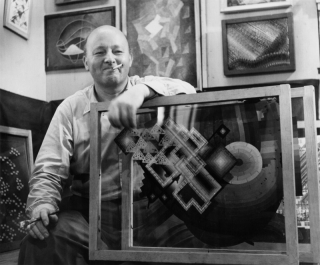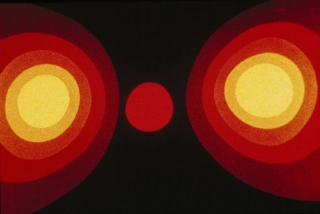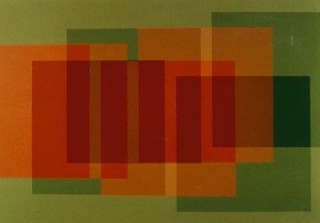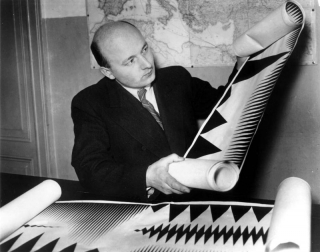Date: 5 December 2003 | Season: Oskar Fischinger
OSKAR FISCHINGER: MUSIC AND MOTION
5—9 December 2003
London Goethe-Institut
A TRIBUTE TO THE PIONEER OF ANIMATION, ABSTRACT CINEMA & VISUAL MUSIC
“Decades before computer graphics, before music videos, even before Fantasia, there were the abstract animated films of Oskar Fischinger (1900-1967). He was cinema’s Kandinsky, an animator who, beginning in the 1920s in Germany, created exquisite ‘visual music’ using geometric patterns and shapes choreographed tightly to classical music and jazz.” (John Canemaker, New York Times)
Oskar Fischinger is one of the masters of animated film and an influential pioneer of abstract cinema. Though fiercely independent and resolute, Fischinger spent periods under contract to major studios including Paramount, MGM, and Orson Welles’ Mercury Productions. During his brief tenure at Disney, he had some early involvement with Fantasia, which diluted, but popularised, many of his theories about the confluence of music and visual movement.
Born in Gelnhausen, near Frankfurt, in 1900, Fischinger trained as an engineer and, becoming interested in the newly emerging avant-garde cinema, invented a wax-slicing animation machine for creating and photographing abstract imagery. Moving to Munich and later Berlin in the 1920s, he began to make his own experimental films, participated in ‘light shows’ with composer Alexander László and did special effects for Fritz Lang’s Frau im Mond. His early, hand-drawn Studies, in which abstract or graphic shapes oscillate and transform, closely synchronised to gramophone records, were among the first examples of ‘absolute cinema’. The 1930s were successful years with public and artistic acclaim, frequent screenings and advertising commissions, leading to an invitation to Hollywood from Paramount Studios. Working with photography, silhouettes, liquids, oil painting, models and charcoal drawings, Fischinger achieved a synthesis of sound and vision, anticipating what later became the music video.
During his years in America, his unique and colourful ‘visual music’ developed through more complex techniques and innovations, and Oskar received the recognition of his peers and support from the Solomon R. Guggenheim Foundation. In later years he turned to painting as film became more expensive and problematic to produce. Fischinger died of a heart attack in Los Angeles, 1967, after which his artistic legacy was secured and promoted by the tireless work of his devoted widow Elfriede and scholar Dr. William Moritz, whose definitive biography of Oskar will be launched at this event.
Special Event – Book launch “Optical Poetry: The Life and Work of Oskar Fischinger”
Saturday 6 December 2003, at 6pm
Free drinks reception courtesy of John Libbey Publishers to celebrate the publication of Dr William Moritz’ long awaited, definitive biography of Oskar Fischinger. This book, and video tapes of Fischinger’s work released by Re:Voir, will be available for sale over the weekend.
The two programmes of films by Oskar Fischinger will also be screened at Dundee Contemporary Arts and Glasgow Film Theatre.
Please Note: This programme now travels under the title “Optical Poetry: Oskar Fischinger Retrospective” and is distributed by the Center for Visual Music.
Photograph of Oskar Fischinger © Center for Visual Music, all rights reserved.
Date: 5 December 2003 | Season: Oskar Fischinger
OSKAR FISCHINGER: THE MASTERWORKS
Friday 5 December 2003, at 7pm
London Goethe-Institut
A selection of Fischinger’s best-known works made between 1927-47, presented in their original formats with new prints restored by Academy Film Archive. This programme includes the early black & white Studies, Composition in Blue, Allegretto, Radio Dynamics, Motion Painting No. 1 and his other finest films.
Oskar Fischinger, R-1 (Ein Formspiel), 1927, 35mm, b/w & colour, silent with separate soundtrack, 7 min (Reconstruction by William Moritz)
Oskar Fischinger, Study No. 1, 1927, 35mm, b/w, silent, 2 min
Oskar Fischinger, Study No. 2, 1930, 35mm, b/w, silent, 2 min
Oskar Fischinger, Liebesspiel, 1931, 35mm, b/w, silent, 2 min
Oskar Fischinger, Study No. 6, 1930, 35mm, b/w, sound, 2 min
Oskar Fischinger, Study No. 9, 1931, 35mm, b/w, sound, 5 min
Oskar Fischinger, Study No. 11A, 1934, 35mm, colour, sound, 3 min
Oskar Fischinger, Kreise (Abstract Version), 1933-34, 35mm, colour, sound, 2 min
Oskar Fischinger, Composition in Blue, 1935, 35mm, colour, sound, 4 min
Oskar Fischinger, Allegretto (Early Version), 1936-43, 35mm, colour, sound, 3 min
Oskar Fischinger, Paragretto, 1936, 35mm, b/w, sound, 3 min
Oskar Fischinger, Allegretto (Late Version), 1943, 35mm, colour, sound, 3 min
Oskar Fischinger, An Optical Poem, 1937, 35mm, colour, sound, 7 min
Oskar Fischinger, An American March, 1941, 35mm, colour, sound, 3 min
Oskar Fischinger, Radio Dynamics, 1942, 35mm, colour, silent, 4 min
Oskar Fischinger, Motion Painting No. 1, 1947, 35mm, colour, sound, 11 min
Oskar Fischinger films provided thanks to The Fischinger Archive, Centre for Visual Music, and The Academy Film Archive.
Screening repeats Monday 8 December at 7pm. The screening on Friday evening will be introduced by A.L. Rees, Senior Research Fellow, Royal College of Art.
This programme will also be shown at Dundee Contemporary Arts on Friday 12 December 2003, and Glasgow Film Theatre on Monday 15 December 2003.
Please Note: This programme now travels under the title “Optical Poetry: Oskar Fischinger Retrospective” and is distributed by the Center for Visual Music.
Film still from Radio Dynamics (Oskar Fischinger, 1942) © Center for Visual Music, all rights reserved.
Date: 6 December 2003 | Season: Oskar Fischinger
THE FISCHINGER EFFECT
Saturday 6 December 2003, at 4pm
London Goethe-Institut
A selection of works by international artists who have been inspired by Fischinger’s works. Including both classics and rare works by Jordan Belson, Larry Cuba, Jim Davis, Jules Engel, Hy Hirsh, Len Lye, Norman McLaren, José Antonio Sistiaga, Alexandre Vitkine and John Whitney.
Norman McLaren, Stars and Stripes, 1939, 16mm, colour, sound, 3 min
Bart Vegter, Four Moves, 1987, 16mm, colour, sound, 7 min
Jules Engel, Rumble, 1975, 16mm, b/w, sound, 3 min
Len Lye, Particles in Space, 1979, 16mm, b/w, sound, 4 min
John Whitney, Celery Stalks at Midnight, 1952, 16mm, colour, sound, 3 min
Jim Davis, Impulses, 1958, 16mm, colour, sound, 10 min
Leif Marcussen, Tonespor, 1983, 16mm, colour, sound, 8 min
Alexandre Vitkine, Chromophonie, 1967, 16mm, colour, sound, 7 min
Jordan Belson, Allures, 1961, 16mm, colour, sound, 7 min
Larry Cuba, Two Space, 1979, 16mm, b/w, sound, 8 min
Hy Hirsh, Come Closer, 1952, 16mm, colour, sound, 7 min
José Antonio Sistiaga, Paysage Inquiétant – Nocture, 1991, 16mm, colour, sound, 14 min
This screening is dedicated to the memory of Jules Engel (1909-2003).
Date: 6 December 2003 | Season: Oskar Fischinger
OSKAR FISCHINGER: RARITIES, LATE FRAGMENTS & ADVERTISING FILMS
Saturday 6 December 2003, at 7pm
London Goethe-Institut
A unique selection of rare films and unfinished experiments, including München-Berlin Wanderung, Spiritual Constructions and Swiss Trip (Rivers and Landscapes). There is also an opportunity to view nine of Fischinger’s advertising films including the legendary Muratti cigarette commercials.
Oskar Fischinger, Study No. 7, 1931, 16mm, b/w, sound, 3 min
Oskar Fischinger, Wax Experiments, 1923, 16mm, tinted b/w, silent, 8 min
Oskar Fischinger, Spiritual Constructions, 1927, 16mm, b/w, sound, 7 min
Oskar Fischinger, Spirals, 1926, 35mm, b/w, silent, 4 min
Oskar Fischinger, München-Berlin Wanderung, 1927, 35mm, b/w, silent, 3 min
Oskar Fischinger, Ornament Sound, 1932, 35mm, b/w, sound, 4 min
Oskar Fischinger, Study No. 8, 1931, 35mm, b/w, sound, 5 min
Oskar Fischinger, Squares, 1934, 35mm, colour, silent, 4 min
Oskar Fischinger, Coriolan Fragment (Unfinished Study No. 13), 1933-34, 35mm, b/w, silent, 1 min
Oskar Fischinger, Coloratura, 1932, 35mm, b/w, sound, 3 min
Oskar Fischinger, Kreise (Tolirag version), 1933-34, 35mm, colour, sound, 2 min
Oskar Fischinger, Muratti Privat, 1935, 35mm, b/w, sound, 3 min
Oskar Fischinger, Borg (Fiesta fragment), 1934, 35mm, b/w, sound, 1 min
Oskar Fischinger, Muntz T.V., 1952, 35mm, b/w, sound, 1 min
Oskar Fischinger, Muratti Grieft Ein, 1934, 16mm, b/w, sound, 3 min
Oskar Fischinger, Oklahomas Gas, 1952, 16mm, b/w, sound, 1 min
Oskar Fischinger, Northern Tissue, 1948, 16mm, b/w, sound, 1 min
Oskar Fischinger, Organic Fragment, 1941, 16mm, colour, silent, 1 min
Oskar Fischinger, Mutoscope Reels, c.1945, 16mm, colour, silent, 2 min
Oskar Fischinger, Motion Painting (fragments), 1950s, 16mm, colour, silent, 4 min
Oskar Fischinger, Motion Painting No. 2 (fragments), c.1960, 35mm, colour, silent, 2 min
Oskar Fischinger, Swiss Trip (Rivers and Landscapes), 1934, 35mm, colour, sound, 13 min
Oskar Fischinger films provided thanks to The Fischinger Archive, Centre for Visual Music, and The Academy Film Archive.
Screening repeats Tuesday 9 December at 7pm. The screening on Saturday evening will be introduced by Monika Koencke, PhD Research Student, Edinburgh University.
This programme will also be shown at Dundee Contemporary Arts on Sunday 14 December 2003, and Glasgow Film Theatre on Wednesday 17 December 2003.
Please Note: This programme now travels under the title “Optical Poetry: Oskar Fischinger Retrospective” and is distributed by the Center for Visual Music.
Photograph of Oskar Fischinger © Center for Visual Music, all rights reserved.



